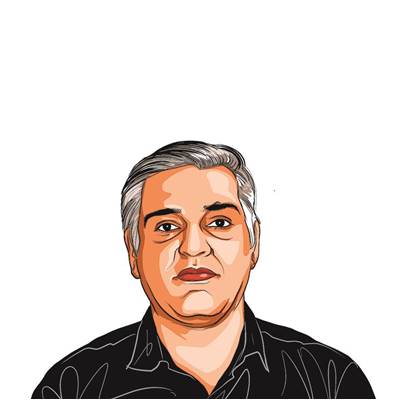Opinion Remembering Patrick French: My patient, my friend
He shall be remembered as one of the most influential biographers of our times. The clarity of narrative, the beauty of prose, and the ability to decipher information through a non-judgemental, multi-prism lens shone through his writings.
 In his book India- An Intimate Biography of 1.2 Billion People, Patrick has analysed information through three prisms — political, economic and social. (Express Photo)
In his book India- An Intimate Biography of 1.2 Billion People, Patrick has analysed information through three prisms — political, economic and social. (Express Photo) On the morning of March 16th, historian, writer and biographer Patrick French breathed his last at a hospital in London. It is a known dictum that as a doctor you are not supposed to get emotionally engaged with your patients. Of the many fallacies which we are taught as part of our medical training, this one is not only absurd but very inhumane. How can one not get emotionally connected with someone one is meeting regularly?
I met Patrick French through cancer. For me, who had read his works, it was strange to know someone as genial as Patrick through such a corrosive disease as cancer. When you come to know a person, you become acquainted with his or her shortcomings. But at times, familiarity brings with it the regret of not having known a person longer.
I knew Patrick French for four years. I wish I had known him much longer. For someone fighting cancer, I do not remember a single instance when Patrick had a whining face. I was always greeted by a naughty, cheeky smile. Even during times of intense anti-cancer therapy, which tends to kill every living cell of the body, Patrick was not only resolutely ready for the battle but astonishingly cheerful. In Illness as Metaphor, Susan Sontag writes that fatal illness has always been viewed as a test of moral character. Patrick passed the test with flying colours.
There is a consensus among friends that Patrick was one of the kindest human beings you could come across. Only in his writings was he authoritative. He shall be remembered as one of the most influential biographers of our times. The clarity of narrative, the beauty of prose and the ability to decipher information through a non-judgemental, multi-prism lens shone through his writings.
In his book India- An Intimate Biography of 1.2 Billion People, Patrick has analysed information through three prisms — political, economic and social. It’s a book with a large and colourful canvas that extends from the thin air of Ladakh to the Khasi tribals of Meghalaya; from the music of A R Rahman to Harpreet Singh Pappu of Bhatinda, who shot to fame for driving 19,000 km in reverse gear. Patrick’s philosophical ability to explain “democratic diffusion” in India is the power of the book. He explained the most difficult of Indian idiosyncrasies with the sweetest of words. The World is What It Is: The Authorised Biography of V S Naipaul stands like a colossus in biographical literature.
We live in times when rewards are coveted. But in 2003, Patrick turned down the Order of the British Empire (OBE). He felt that it was essential to say no to the rewards of the state to guard his independence as a writer. He said that a writer is a free agent. One of his earliest works, Tibet, Tibet: A Personal History of a Lost Land is an outstanding testimony to his love for freedom. He writes about Tibet: “The place was ruled not by terror, as it had been once, but by constant mental supervision; the absence of freedom”. Patrick did not define the “absence of freedom”. But from our interactions, I knew he abhorred the “absence of freedom”, wherever it happened and whoever was the culprit.
His sense of humour (I detest calling it British) had a distinct academic tinge. He was being administered a medicine called Daratumumab. Once I sent him a message asking: “How is Dara behaving?” I immediately realised that he might not understand what I was asking, so sent another message with the complete name of the medicine. Prompt came the reply: “Don’t worry I also call it Dara, Dara Shako.” (The medicine had presumably given him some shivering. Hence, he called it Shako)
I once asked him to sign a book of his for me. He wrote: “To dear Shah, who is often in my thoughts”. Now, you shall cloud my thoughts forever, Patrick.
Dear Patrick, even as you fly away with the angels and leave us with our profound grief, let me remind you of a statement you made while undergoing treatment. You had said that cancer treatment was like going through hell and back, but the mind and the body have a way of quickly forgetting the awfulness and resurrecting. I wish your resurrection. I wish your mind and body would forget the awfulness. This evil world needs writers, healers, and friends like you. Your untimely departure reveals the immorality of death, that can only be redeemed by resurrection. Till that happens, may you rest in peace, my friend.
The writer is professor, Department of Orthopaedics, All India Institute of Medical Sciences, Delhi






